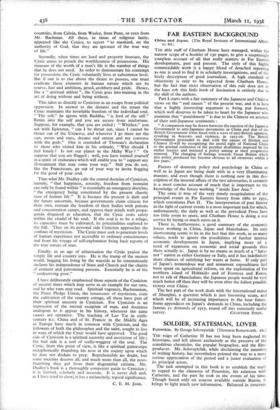SOLDIER, STATESMAN, LOVER
Potemkin. By George Soloveytchilt. (Thornton Butterworth. as.)
THE reign of Catherine II has too long been neglected by historians, and left almost exclusively as the preserve of the scandalous chronicler, the popular biographer, and the film- produc er. Mr. Soloveytchik, while disclaiming the intention of writing history, has nevertheless pointed the way to a more serious appreciation of the period and a juster evaluation of its principal actors.
The task attempted in this book is to establish the truth in regard to the character of Potemkin, his relations with Catherine, and the part he took in the events of his time. Though based only on sources available- outside Ruisia, it bringd to light much new information. Balanced in structure and objective in tone, it is written with insight and under- standing of its subject.
The stages in Potemkin's rise to power as the fifth in the long line of Catherine's lovers are described in ample detail,- and the hold he established over the Empress is convincingly explained. Mr. Soloveytchik points out that Catherine, in spite of her capacity, needed a strong, reliable man who would advise her and shoulder part of her responsibilities. No one more fitted for the part than Potemkin could have been found among her entourage. His role as Catherine's lover, and, if Mr. Soloveytchik's story is accepted without more precise evidence, as her husband, was merely a secondary, episodical one, the stepping-stone to higher things.
Potemkin had many qualifications, both as lover and states- man. Witty and cultured, sharing all the serious interests of the many-sided Catherine, he showed a remarkable talent for practical affairs. Catherine seems to have thought him the handsomest man she had ever met, overlooking his loss of one eye, a tendency to stoutness, and an unpleasant habit of nail- biting. In the years following his succession to the office of favourite Potemkin received vast rewards and favours, yet he was not satisfied. Relations with Catherine were sometimes stormy, and though their quarrels were usually settled on the initiative of the Empress herself, Potemkin had to face the con- stant danger of reduction to the ranks. But he and Catherine had great projects for the future of Russia. He decided to disengage himself from the romantic side of his relationship to Catherine, in order to keep the reality of power that it had brought him. The story of Potemkin's withdrawal from the " alcove " might be paralleled from the history of many other courts, but it would surely be difficult to find any parallel to his subsequent role of " supervisor of what may be described as Catherine's shifting male harem." In the next thirteen years he made and unmade in succession no fewer than fifteen favourites.
Once clear of this passionate entanglement, Potemkin turned his attention to more serious business, and the remainder of his life was given to service to his country for which he has had little recognition. During the whole of that time he was invested with the control and direction of practically all the affairs of State. Catherine trusted him unreservedly, and their correspondence reveals the frank, outspoken and intimate relations that bound them together.
Potemkin's activities in this period included work of the first importance in the development of the southern provinces, or New Russia, which he had taken a prominent part in conquer- ing. He understood that merely conquering territory was not enough, that it ought to be consolidated. Fortifying strategical points, building new towns, establishing settlers on the land and founding industries were only a few of the tasks he under- took in this connexion. The rounding off of Russia's hold on the south by the annexation of the Crimea, the foundation of a naval base at Sevastopol, and the creation of a it Sea fleet were also due to him. When he took it into his head to show Catherine, and Europe too, what he had accomplished, he had plenty of real worth to display to his visitors without building pasteboard villages.
Amidst all his other activities, and the ceaseless travel they involved, Potemkin kept a watchful eye on Russia's foreign policy. Mr. Soloveytchik narrates the story of England's approach to Catherine for assistance in fighting the American colonists, and for a defensive alliance. Both these applications were turned down, in spite of strong support from Potemkin— one of the few instances in which he did not succeed in getting his way with Catherine.
Many stories are told of Potemkin's extravagance, his eccen- tricities, his disregard for ordinary conventions and moral standards. Nothing that his detractors can say against him can diminish the real service he rendered to Russia, as adminis- trator, builder, general and diplomat. The hold he retained over Catherine is shown by her conduct when she learned the news of his death. " Now I have no one left on whom I can rely," she exclaimed amid hysterical tears. " He was a true nobleman. He did not sell me. No one could buy him." The letter she wrote to Grimm (quoted on the last page of Mr. Soloveytchik's book) is a moving epitaph to a great collaboration.
Historical legends are hard to kill, and those associated with the name of Potemkin will doubtless live on for many years longer. Mr. Soloveytchik has at least dealt them a first blow, in
a scholarly and lucid biography. G. A. BIRKETT.











































 Previous page
Previous page